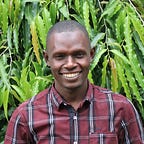In the driving seat in South Sudan
One woman’s journey from refugee to driving towards Zero Hunger
Nancy Kejji is one of a kind.
A woman who is determined to succeed under adversity, while challenging the status quo to find her place in a profession largely dominated by men.
Against all odds Nancy learnt to drive and for the last year has been a treasured driver for the World Food Programme (WFP) in South Sudan.
Born in a large family of 20 children, just to survive was a struggle of its own. From an early stage, Nancy knew life would not be a walk in the park.
“I was born in 1992 in Kajo Keji, but shortly we fled to Uganda where we lived in a refugee camp known as Rhino,” Nancy says as she recalls some of the events that shaped her. “The situation in the refugee camp was tough.”
One of a few
After 10 years Nancy and her family returned to their home area of Yei, a town located approximately 170 km, southwest of South Sudan’s capital Juba. While her family was trying to settle in as returnees, Nancy’s mind was thinking about education.
“I knew the situation was bad,” she says. “But it could only get worse if I did not do anything about it.” She didn’t want to be defined by war.
While it is normal for women to drive in South Sudan, very few actually make it their profession. So how did Nancy start?
“I attended Yei primary school where I finished primary level education,” explains Nancy who goes to the gym daily to keep in shape. “When I finished primary seven, my father asked me which course I wanted to study, I candidly said anything to do with vehicles.”
Nancy was determined to shatter the stereotype by following a career path considered reserved for men.
More than a driver
She joined Yei vocational training college, where she mastered the nitty-gritty of mechanics. She recalls being among the top students in her class of over 60 students, only 10 of which were women. When Nancy graduated as a mechanic in 2010, she had also qualified as a driver.
“I have a good understanding of engine systems and car electric systems,” says Nancy as she opens the bonnet of a WFP vehicle. “It was never easy learning these skills but am glad I grasped them.”
To Nancy the huge disparity between the number of men and women in her class, was an indication the road ahead would be tough. However. she was determined to motivate other girls in her community and had a vision to someday work for a United Nations agency.
“Professionally I am a trained mechanic, but many NGO’s don’t employ mechanics as they outsource. The easiest way to get employment was to switch to driving, because I had learned how to drive while in college,” she explains.
Joining WFP
When WFP advertised a vacancy for a driver’s position, she knew it was time to put her best foot forward. Of the nine candidates interviewed, three were women.
Her previous experience working as a driver with the government of South Sudan gave her an advantage.
“I used to drive off-road vehicles. I learned how to limit speed depending on circumstances so during the interviews I knew what to do,” she says. “In fact, I used part of the money from that job to go back to school, I studied and obtained secondary school certificate.”
When Nancy received an email confirming she was successful, she was not only excited but slightly apprehensive as it was the beginning of a new challenge.
She says working in a male-dominated field has more advantages compared to what she initially thought.
“My colleagues are very supportive whenever I get any challenge I consult and they help,” she says. “In most cases, this is not the case in a field dominated by women.”
“I have been able to educate my children and now I have some personal development projects,” she says as she smiles. “I am also able to take care of my gracefully aging parents.”
What men can do, women can do better
But in an organization that has a fleet of cars, what is Nancy’s favorite?
“The off-road vehicles’ stability on rough terrain and the command of the person behind its steering wheels make me feel in charge,” she says.
To her driving is an art that anyone can learn and be the best with time.
“Off-road driving is not only for men, if men can drive why not women?” she questions. “As women, we should not only think about selling tea by the roadside, go to school get skills and compete for jobs.”
Nancy is not done yet.
“I want to go back to school and study public administration,” she says. “I love dealing with people and administration might as well provide me the platform.”
